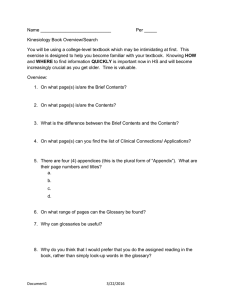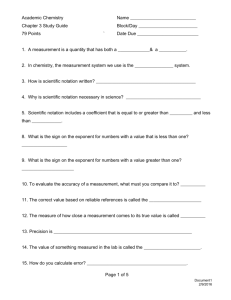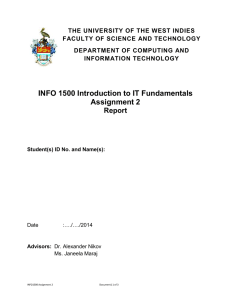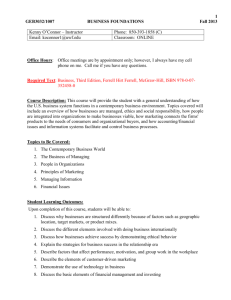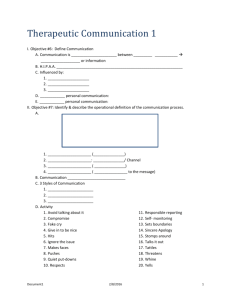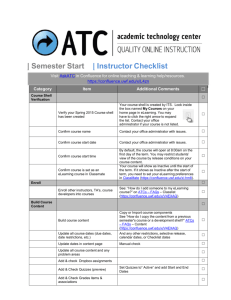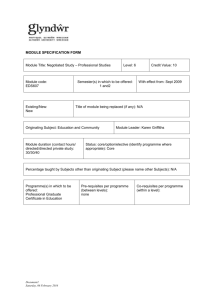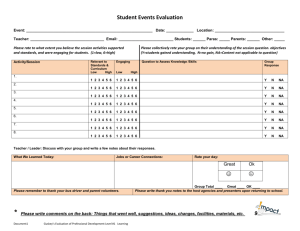ACG 3311 Applied Managerial Accounting
advertisement
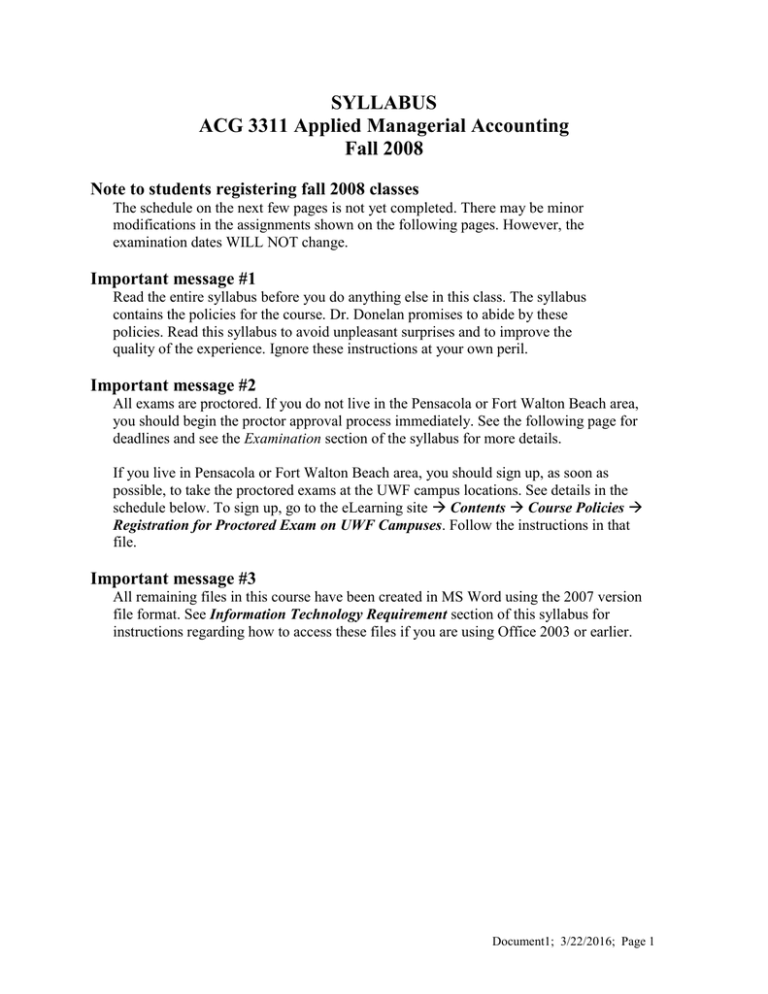
SYLLABUS ACG 3311 Applied Managerial Accounting Fall 2008 Note to students registering fall 2008 classes The schedule on the next few pages is not yet completed. There may be minor modifications in the assignments shown on the following pages. However, the examination dates WILL NOT change. Important message #1 Read the entire syllabus before you do anything else in this class. The syllabus contains the policies for the course. Dr. Donelan promises to abide by these policies. Read this syllabus to avoid unpleasant surprises and to improve the quality of the experience. Ignore these instructions at your own peril. Important message #2 All exams are proctored. If you do not live in the Pensacola or Fort Walton Beach area, you should begin the proctor approval process immediately. See the following page for deadlines and see the Examination section of the syllabus for more details. If you live in Pensacola or Fort Walton Beach area, you should sign up, as soon as possible, to take the proctored exams at the UWF campus locations. See details in the schedule below. To sign up, go to the eLearning site Contents Course Policies Registration for Proctored Exam on UWF Campuses. Follow the instructions in that file. Important message #3 All remaining files in this course have been created in MS Word using the 2007 version file format. See Information Technology Requirement section of this syllabus for instructions regarding how to access these files if you are using Office 2003 or earlier. Document1; 3/22/2016; Page 1 Schedule of topics, examinations, and assignments (Readings and homework dates may change. Exam dates will not change.) Date Week of August 25 Topic Financial accounting Reading and homework Edmonds chapter 1 notes, homework, and videos Week 1 Aug. 31 Homework 11:59 pm due ALEKS eLearning For-Credit Homework due. Go to eLearning site, Contents, Course Material, eLearning Assignment. Assignment is for 4 points. Edmonds chapter 1 For-Credit Homework due. 6 points. You will find the assignment instructions at the beginning of the Chapter 1 Notes file posted to eLearning. Begin your work on ALEKS. This assignment is due [see date below], and it could take anywhere from 2 to 20 hours to complete. See Contents section of eLearning for the ALEKS instructions. Document1; 3/22/2016; Page 2 September 3 – September 16 I will be in Germany during this time period teaching one of our German MBA cohorts. Synchronous communication with me will be challenging. I can call you, but I will be seven hours ahead of you, so I won’t be able to return any correspondence late in your day (Central North American time), as it will be late at night in Germany. But I do have a low-cost calling plan, and I do not mind calling you. Just try to be specific about the time that you can be reached. I will, of course, be checking e-mail and eLearning discussions frequently. Week of Financial Sept. 1 accounting Edmonds chapter 2 notes, homework, and videos Week 2 ALEKS Sept. 7 11:59 pm Sept. 7 ALEKS assignment is due on [see date below], and it could take as anywhere from 2 to 20 hours to complete. DO NOT wait until the final weekend to start this project. Technology glitches are very difficult to solve over weekend hours. Moreover, there will be an additional homework problem [from one of our chapters/readings] due on the same night as the ALEKS deadline. Don’t wait until the last minute. See ALEKS Instructions in the Contents section of eLearning. Homework due Edmonds chapter 2 For-Credit Homework due. 6 points. You will find this assignment at eLearning site, Contents, Course Material, Chapter 2 Notes. Instructions are posted at the beginning of those chapter 2 notes. If you reside outside the Pensacola or Ft. Walton Beach area and you want to take your exams in a location other than the UWF campus at Pensacola or the UWF campus at Fort Walton Beach, you have 6 days from this date to get the Proctor Approval Form completed and delivered to Dr. Donelan. See specific information about exam dates and locations in week 4 section of this class schedule. Document1; 3/22/2016; Page 3 Week of Excel Sept. 8 Week 3 Financial accounting Spreadsheet skills document and videos. Fundamental Financial Accounting document and videos ALEKS Complete THESE TWO MODULES ONLY: Basic terminology Basic transactions and financial statements See ALEKS Instructions in the Contents section of eLearning. Sept. 14 Deadline for Proctor Approval Form. If you plan to take the exam using a remote 11:59 pm proctor, today is the deadline for delivering the completed Proctor Approval Form to Dr. Donelan. Sept. 14 Homework JD, Inc. For-Credit Homework assignments due by midnight. 11:59 pm due This homework can be found in Fundamental Financial Accounting reading. 10 points Sept. 14 ALEKS due ALEKS completion deadline. 30 points. Both of these required: 11:59 pm 1. Basic Terminology and Basic Transactions and Financial Statements modules of ALEKS must be completed today 2. ALEKS Signed Statement of Individual Work posted to eLearning Rhythm Document1; 3/22/2016; Page 4 Week of Sept. 15 Week 4 Exam 1 A portion of this exam will involve use of Excel to solve a financial statement preparation problem. Computers will be used for that portion of the exam. See syllabus for notes allowed in remainder of exam. Sept. For students at remote locations, Exam 1 must be proctored during these four 15-18 days. Your hard copy examination materials submitted to me must be postmarked no later than September 19. See syllabus for instructions regarding remote proctor approval. Sept. 19 For students in Fort Walton Beach area, Exam 1 will be administered at the UWF campus at 1170 M. L. King Blvd, building 7 (computer lab), room 751 (enter through room 750 on the second floor). To reserve a seat in this exam, go to the eLearning site Contents Course Policies Registration for Proctored Exam on UWF Campuses. There is room for 20 students in this session. Reservations are first-come, first-served. Exam time: 5:30 pm to 8:00 pm. Sept. 20 For students in the Pensacola area, Exam 1 will be administered at the UWF campus at 1100 University Parkway. Session a: 9:00 am to 12:00 am, building 76, room 127 Session b: 12:30 am to 3:30 pm, building 76, room 127 You can take the exam at either session a or b. To reserve a seat in this exam, go to the eLearning site Contents Course Policies Registration for Proctored Exam on UWF Campuses. There is room for only 28 students per session. Reservations are first-come, first-served. Document1; 3/22/2016; Page 5 Week of Cost concepts Sept. 22 Maher Ch 2 Week 5 Sept 28 Chapter 2 For-Credit Homework due (10 points) MarginCorp LowInventory 11:59 pm Week of Cost Sept 29 estimation Maher Ch 4 Week 6 Oct. 5 Chapter 4 For-Credit Homework due (5 points) 11:59 pm Week of Forecasting Oct. 6 income Edmonds Chapter 8: Performance evaluation, flexible budgets, and income forecasting Week 7 Week of Forecasting Oct. 13 balance sheets Forecasting Balance Sheets reading and videos Week 8 Oct. 19 11:59 pm For-credit homework due; 10 points; This is an individual work projects. Do not work in teams. See syllabus for code of conduct relating to homework handed in for credit. Note to students: this section not yet completed. This reading not yet posted to eLearning. When posted, the notes will contain instructions about the For-Credit Homework. Following notes for Dr. D: use DAPA2 –type problem or 2008 05 ex2-type Use two separate problems; one w/ straight forecast. Second w/ inv. target Document1; 3/22/2016; Page 6 Week of Prepare for exam 2 Oct. 20 Week 9 Exam 2 Oct. 20-23 For students at remote locations, Exam 2 must be proctored during these four days. Your hard copy examination materials submitted to me must be postmarked no later than September 23. Oct. 24 For students in Fort Walton Beach area, Exam 2 will be administered at the 1170 M. L. King Blvd. 5:30 pm to 8:30 pm (room assignment will be announced at a later date). To reserve a seat in this exam, go to the eLearning site Contents Course Policies Registration for Proctored Exam on UWF Campuses. There is room for 20 students in this session. Reservations are first-come, first-served. Oct. 25 For students in Pensacola area, Exam 2 will be administered at the UWF campus Saturday at 11000 University Parkway. Session a: 9:00 am to 12:00 am, building 76, room 127 Session b: 12:30 am to 3:30 pm, building 76, room 127 You can take the exam at either session. To reserve a seat in this exam, go to the eLearning site Contents Course Policies Registration for Proctored Exam on UWF Campuses. There is room for only 28 students per session. Reservations are first-come, first-served. Document1; 3/22/2016; Page 7 Week of Forecasting with Targets reading, pages 1-14 Oct. 27 Week 10 Review videos 1, 2, and 3 For self-study, work these during this week: Del Vello problem, parts 1, 2, 3, and 4 (approximately page 8 of the notes) Emily Equity (beginning on approximately page 18 EmilyDebt (beginning on approximately page 20) Edmonds chapter 13, problem 13-23A parts a, b, d, e, f, g, h, j, l, m, n, o Edmonds chapter 13, problem 13-24A Week of Complete Forecasting with Targets reading. Nov. 3 Finish viewing remaining videos. Week 11 Complete DeborahFord1 case. Nov. 9 DeborahFord case due; 10 points. This is an individual work projects. Do not 11:59 pm work in teams. See syllabus for code of conduct relating to homework handed in for credit. Week of Nov. 10 Financial statement analysis Week 12 Reading and homework assignment details will follow at a later date. Week of Nov. 17 Financial statement analysis Week 13 Reading and homework assignment details will follow at a later date. Week of Nov. 24 Prepare for final exam Week 14 Document1; 3/22/2016; Page 8 Week of Dec. 1 Prepare for final exam Week 15 Comprehensive Final Exam Dec. 1-4 For students at remote locations, Exam 3 must be proctored during these five days. Your hard copy materials submitted to me must be postmarked no later than December 5. Dec. 5 For students in the Fort Walton Beach area, Exam 3 will be administered at the UWF campus at 1170 M. L. King Blvd, Fort Walton Beach. 5:30 pm to 8:30 pm, [room announcement at a later date To reserve a seat in this exam, go to the eLearning site Contents Course Policies Registration for Proctored Exam on UWF Campuses. There is room for 20 students in this session. Reservations are first-come, first-served. Dec. 6 For students in the Pensacola area, Exam 3 will be administered at the Pensacola Saturday campus at 11000 University Parkway. Session a: 9:00 am to 12:00 am, building 76, room 127 Session b: 12:30 am to 3:30 pm, building 76, room 127 You can take the exam at either session. To reserve a seat in this exam, go to the eLearning site Contents Course Policies Registration for Proctored Exam on UWF Campuses. There is room for only 28 students per session. Reservations are first-come, first-served. Document1; 3/22/2016; Page 9 Text book The text book is a custom-published text published by McGraw-Hill/Irwin Primis Online. The title page follows: You can purchase either a hard copy text or an e-book. Hard copy text Available only through the UWF bookstore Black and white printing, soft cover Cost is approximately $50 (plus shipping if you have the UWF bookstore mail the book to you. Allow 10 days for mailing.) ISBN: 978-0-390-23041-6 You can purchase the printed version by visiting the UWF bookstore in Pensacola or you can have the bookstore send you the book by calling 850-474-2150 or going online to http://www.bkstr.com/CategoryDisplay/10001-10001-107591?demoKey=d. You will have to pay shipping if you have the book sent to you. eBook You can purchase an eBook version of the text directly from McGraw-Hill/Irwin. See Primis eBook Purchase Instructions file posted to the Course Policies section of eLearning under the Syllabus subsection. The ISBN for these books follow: ISBN-10: 0-39-024487-2; ISBN-13: 978-0-39-024487-1 Cost is approximately $50 for the e-book. For this price you get one version, either the pdf or the html. If you want both, you must pay for both. If you buy the html, but change your mind and decide you want the pdf version so that you can save and print the text, Primis said they would “work with you.” You have two eBook purchase options: pdf file version of the eBook o pdf version of the e-book is in full color and is in printable (.pdf) format o Primis has built a locking mechanism into the .pdf file so that it cannot be copied to any other PC hard drive, or removable storage. So if you select .pdf version, be sure to download it to the PC or removable drive where it will remain for the entire semester. However, you can sign up for a Microsoft .NET Passport or Adobe ID. If you do not have a .NET Passport or an Adobe ID. If you want to do this, you are on your own. I have not gone through that process, and therefore I can’t provide any support for Document1; 3/22/2016; Page 10 accomplishing those registrations. But if you do go through that process, you should be able to transfer your digital pdf text between any computers where you have activated Adobe Reader or Acrobat using the same .NET Passport or Adobe ID. o Primis has build a locking mechanism into the pdf file so that it can be printed ONLY ONE TIME. To print a second time, you have to buy the additional rights. html file version of the eBook o html version is in full color and is viewable with any web browser from any PC. o You can print the html version, but you are limited to printing 10 pages at a time, so printing the entire book would be a lot of trouble. The UWF bookstore will not purchase a sufficient number of hard copy books to serve 100% of the enrolment for this class, so if you want hard copy, get to the bookstore early to assure that you get a copy. If you do not get a hard copy book from the UWF bookstore, you can purchase the e-book book directly from Primis. eBook versus hard copy In past semesters of online offering of this course, approximately 40% of my students have selected the eBook version. I surveyed my last class, but only five students responded to the survey. Here is the survey question and their replies: If I had to do it all over again, I would purchase the online text again. Strongly agree Agree Neutral Disagree Strongly disagree 0 1 1 0 3 Optional Texts Any college level English grammar textbook A Microsoft Excel tutorial CD, or on-line tutorial such as www.usd.edu/trio/tut/excel, or any basic tutorial book available from any bookstore (Amazon.com lists 5 books starting at $29). Document1; 3/22/2016; Page 11 Text book contents screen capture Text book contents are reproduced here so that you can confirm that you have the correct text. Class notes by Dr. Donelan When you go to the eLearning site, under contents, you will find various types of files: 1. 2. 3. 4. Dr. Donelan’s class notes that accompany the text book Videos that follow Dr. Donelan’s class notes eReserve material (posted by the library) Other material You will need to have printed copies of the class notes. Or, you will need to have multiple monitors at your PC station so that you can view videos and document contents simultaneously. But honestly, I think that using dual monitors is far more challenging than just having printed copies of the notes. Document1; 3/22/2016; Page 12 Test book page numbering In the custom-published text, you will find page numbers for both the original text and the custom published text. In all of my chapter notes and all of my communications to you, I will always use the original text page which appears in black font below the text identification header (see below). Original text page number used in all of Donelan’s notes Required software license You are required to purchase a user’s license for ALEKS, which will cost approximately $30. For a description of this internet-based training, see ALEKS Instructions in the Contents section of eLearning Financial cost of this class Custom published text ALEKS Printing of notes (approximate) Total estimated cost $50 30 30 110 Other UWF instructors use ALEKS ($30) and a Horngren textbook ($173). If you subtract a resale value of approximately $80 on the new Horngren text, you would have a net cost of about $120 if you take the course from another instructor. We all wish that books were not so expensive, but they are. Instructor Dr. Joseph G. Donelan Dr. Donelan’s contact information 1170 M. L. King Blvd., building 4, room 469 Ft. Walton Beach home office: 850-986-2464 (this number rings through to my cellular phone when I am not in my office). Document1; 3/22/2016; Page 13 Office hours at the Pensacola campus: On the following Monday and Wednesday dates, 4:30 -5:30 p.m. and 9:00 – 10:00 p.m., building 72 (the new recreation center building), room 211. October 20, 22, 27, 29, November 3, 5, 12, 17, 19, 24 Dec 1, 3, 10 I will come earlier than 4:30 p.m. on those dates if you call me or send me an e-mail in advance. Office hours at the Fort Walton Beach campus On the following Tuesday and Thursday dates, 4:30 -5:30 p.m. and 9:00 – 10:00 p.m., building 4, room 467. October 21, 23, 28, 30, November 4, 6, 13, 18, 20, 25 Dec 2, 4, 11 I will come earlier than 4:30 p.m. on those dates if you call me or send me an e-mail in advance. During all my posted office hours, I will have my cellular phone activated. So no matter where I am, you should be able to reach me by phone. I encourage you to call. Online Elluminate® office hours I will hold online synchronous office hours using the Elluminate® web conferencing system. You will receive an e-mail invitation about 24 hours prior to each session with a link to the session. Elluminate session dates follow: August 31, 8:00 pm – 9:00 pm September 18, 8:00 pm – 9:00 pm September 28, 8:00 pm – 9:00 pm October 19, 8:00 pm – 9:00 pm November 30, 8:00 pm – 9:00 pm Open lines of communication I encourage you to call me at my home office. I am generally available from 10: 00 a.m. through 10:00 p.m. every day of the week. But the best times to reach me follow: 10 a.m. to 11:00 a.m. 9:00 pm to 10:30 p.m. Please do not call earlier than 10 a.m. or later than 10:30 p.m. On weekends, of course, I am less predictable. But I am usually working on Sunday evenings, so that is also a good time to reach me. If you can’t reach me by phone, but would like to talk about an issue, send an e-mail with your phone number and a good time to contact you, and I will call you, wherever you are. Document1; 3/22/2016; Page 14 I am accessible by e-mail and phone. Please feel free to send me an e-mail or give me a call. Germany travel I am in Mannheim, Germany teaching our MBA cohort there on these dates: September 3 - 16 October 1 – 14 Synchronous communications with me during that time will be challenging. I will be seven hours ahead of you, so we could only have telephone conversations early in your day here in the USA. But I do have low-cost phone service, and I don’t mind calling you during those dates. e-mail: jdonelan3311@cox.net (checked frequently every day). Although I have a uwf.edu e-mail address, I prefer that you use the jdonelan3311@cox.net address shown above, as it is the most dependable and fastest way to contact me. Avoid sending me e-mail through the eLearning system, because the message will go to my .uwf e-mail box. Public discussion questions Use the eLearning discussion groups to ask all non-private questions, whether it is a question for Dr. D or an open question to anyone who can answer. For example, if you don’t know the due date of an assignment, ask that question in the Administrative discussion area. If someone else does not answer it first, Dr. D will answer it when he next checks the site. Private discussion questions for Dr. D’s eyes only If you have a private question that is appropriate for Dr. D’s eyes only, then send him an e-mail at jdonelan3311@cox.net. Exam policies The examinations must be proctored. Northwest Florida students Students residing in northwest Florida should attend an instructor-proctored exam session at either Pensacola or Fort Walton Beach. There are three separate proctor times in the two different locations. See the Schedule of Topics, Examinations, and Assignments for exam dates and times. To reserve a seat, go to the eLearning site Contents Course Policies Registration for Proctored Exam on UWF Campuses. Reservations are firstcome-first-served. If you live in NW Florida, but are unable to attend any of the exam sessions at the dates/times that are being proctored by Dr. Donelan, you can arrange remote proctoring. See the next section, “Students outside the Pensacola or Fort Walton Beach area,” for details. Document1; 3/22/2016; Page 15 Students outside the Pensacola or Fort Walton Beach area Students who reside outside of this geographic area must make arrangements to have the exams proctored by an individual that is acceptable to the instructor. Students should contact the accounting department or testing center at their local university or community college and request such assistance. If you reside close to any UWF campus, testing centers are provided to UWF students at no cost (us this link http://uwf.edu/learningcenter, or send an e-mail to learningcenter@uwf.edu Students who will be using a proctor must complete and submit a Proctor Approval Form (found at the course eLearning site). The deadline for proctor approval form submission is noted in the schedule of topics and examinations. The deadline is the date by which the instructor must receive your application. Completed proctor approval forms should be submitted to Dr. Joseph Donelan by any of the following delivery modes: Hard copy mail to the address shown on the form Scanned image e-mailed to the address shown on the form Cumulative nature of exams Exams are cumulative in nature; however, emphasis is given to material most recently covered. In other words, each exam will address the material covered in the segment of the course completed just prior to the exam and since the last exam. Exam retention Your instructor will retain possession of the exams during the current semester and the first two weeks of the following semester. After that, they will be destroyed. Students wishing to see their exams should do so during the current semester or within two weeks of the beginning of the following semester. Missing an exam It is not possible for me to write comparable make up exams, and it is unfair to provide exactly the same exam to any student either before or after the scheduled exam dates. Accordingly, the exams are command performances for you. Please tell your employer and your family that you need the exam dates free. Excused absences from exams are rare, but might include reasons such as death in the immediate family, accident, TDY, or serious illness. I will need to receive some type of notification prior to the exam regarding your intended absence from the exam. If I do not receive notice and adequate documentation of the reason for missing the exam, I will assign a zero for that exam. In the event of an excused absence, you will be allowed to take a three-hour comprehensive make-up exam on the dates shown below. The comprehensive make up exam substitutes for only one missed exam, exam 1 or exam 2, but not both. If you miss both exam 1 and exam 2, you will earn a zero on one of those two exams, and you can take the makeup exam in place of the other. The comprehensive make up exam cannot be used to substitute for a low score on a previous exam. The comprehensive make up is not an attractive alternative; avoid it. Document1; 3/22/2016; Page 16 If you have an excused absence, you can choose from the following four options for taking the comprehensive make up exam: 1. Friday, December 5 or Saturday, December 6 during one of the final exam sessions that you have not selected to take your regularly-scheduled final exam. In other words, you would take the comprehensive make up exam during one of the three times, and your regular final exam during another of those times. 2. Wednesday, December 10, at the Pensacola campus, building 76, room 127. 3. Thursday, December 11, at the Fort Walton Beach campus, building 7, room 751. 4. Using an approved proctor, the exam may be taken any time between 8:30 am Wednesday, December 1 and 5:00 pm Thursday, December 4. If you select this option, you must submit the completed Proctor Approval Form to Dr. Donelan by November 24, 2008 at the latest. See an earlier section of this syllabus for a description of this form. Exam calculators You must bring your own calculator to all exams. I recommend you bring two calculators so that you have a spare. You may also use any calculator of your choice, but no palm or laptop computers. Exam note paper During each of the exams, you will be allowed to use a note paper. You may put anything you want on the note paper; it may be hand-written, typed, or photocopied and pasted up. However, if you past up printed copy, the pasted up material must be firmly glued, and taped on all four sided so that I don’t have to look under any pasted up material. The note paper can include any material of your choosing including, but not limited to, solutions to homework problem, class notes, or sections from the text book pages. You may work together with other students to create notes for the exam, but you may not share (pass back-and-forth) note papers during an exam. The exam proctor will inspect your notes during the exam. Violation of the notes rules represents a violation of our code of conduct, and will result in a zero on the exam or failure in the course. The total size must meet the specifications below: Exam 1 — you will be allowed to use ½ sheet of standard letter paper. This means that you can use a piece of note paper that is 8.5-by-5.5 inches. You may write or print on one side only. Do not use odd-size paper. Exam 2 — you will be allowed to use one side of a full sheet of standard letter paper. This means that you can use a piece of note paper that is 8.5-by-11 inches. You may write or print on one side only. Do not use odd-size paper. Comprehensive final exam is open notes and open book. But don’t be lulled into a misguided sense of comfort over this. The exam is long and hard. If you don’t Document1; 3/22/2016; Page 17 prepare well and practice adequately, you will never finish. If you have to look up everything, you will never finish. Exam 1 and 2 performance feedback There are several ways for you to find out where you missed points (and thus where you may want to concentrate future study): If you take the proctored exam at a UWF location, then bring a selfaddressed stamped envelope to the examination. Or send me a selfaddressed envelope. I’ll send you some pages from your solutions with my notations. But I need to get these envelopes from you by the 3rd day after the exam, or I won’t be able to reply. Call me or send me an e-mail. I’ll discuss it with you. Some exams will remain closed, so I may not be releasing the questions. However, to assist you in your study, I will provide you with a general description of the contents of the exams after they are graded Grading Your final grade will be based on the total points you have earned at the end of the semester. The approximate points available are as follows: Approximate points Exam 1 100 points Exam 2 120 points Comprehensive final exam 140-160 points ALEKS 30 Fundamental Financial Accounting Principles For20 Credit homework Other cases and homework 60-100 Semester total Bonus points available Critical success factor analysis feedback Discussion participation and Q&A participation 480 to 530 points 5 points 10 to 20 points maximum Document1; 3/22/2016; Page 18 Final grade based on percent of total points earned: Letter grade Start (%) End (%) GPA points F 0 62.9999 0.0 D 63 66.9999 1.0 D+ 67 69.9999 1.3 C70 72.9999 1.7 C 73 76.9999 2.0 C+ 77 79.9999 2.3 B80 82.9999 2.7 B 83 86.9999 3.0 B+ 87 89.9999 3.2 A90 93.9999 3.7 A 94 100.000 4.0 If your examination average is "D" or less, your grade may be based on examinations only. I use two significant digits in my grade computations, and I do not round up. Therefore, 89.9999% would be a B-plus grade. eLearning Discussion Group Participation and Bonus Points There are discussion groups at the eLearning web site. This is where Dr. D will answer questions. There are bonus points available for participating in discussions, questions, and answers. Bonus points are awarded for thoughtful questions and well-written and correct responses to questions. The more meaningful and significant the question and response, the more points earned. Useless comments are a waste of my time and yours, and if you post too many useless “I agree” type comments, I will delete your name from the participation roster, and you will be blocked from further participation. Moreover, you would make me mad, and you don’t want to do that. Public discussion questions Use the eLearning discussion groups to ask all non-private questions, whether it is a question for Dr. D or an open question to anyone who can answer. For example, if you don’t know the due date of an assignment, ask that question in the Administrative discussion area. If someone else does not answer it first, Dr. D will answer it when he next checks the site. Other discussion areas are organized by topic. Occasionally, Dr. D will ask a question in a video, or he may post a question in the discussion area. Participation in this type of question may be worth bonus points. Alternatively, your fellow students may be using the discussion areas to ask “how do I do it” type questions about homework or practice exams. Helping fellow students by answering their questions may also be awarded bonus point awards. Private discussion questions for Dr. D’s eyes only If you have a private question that is appropriate for Dr. D’s eyes only, then send him an e-mail at jdonelan3311@cox.net. Document1; 3/22/2016; Page 19 Chapter notes Chapter notes and other important course information are posted to the course eLearning site. Print a hard copy of these notes and refer to them when reading the assignment and when listening to the instructor’s presentations. Sometimes, these notes are available in hard copy at the bookstore. If so, Dr. D will make that announcement prior to the class. If no announcement, then you need to print them yourself. If you print them yourself, I recommend this technique: The eLearning Assignment reading provides a few suggestions about saving, printing, and organizing these notes. a DOCX Prerecorded and live instructor presentations Your instructor will provide a number of prerecorded presentations that cover the material in the readings. He will also work through selected homework problems using either prerecorded or live internet broadcasts. Here are my recommendations for using these: Find a quite study location with desk space. Have your book, your chapter notes, a calculator, notebook, and any other equipment that you would normally take to a regular classroom setting. Get familiar with the pause, reverse, and fast forward controls on your PC video player so that you can easily navigate. Use the pause liberally. College of Business minimum grade requirement A minimum grade of C is required in all College of Business courses. If you receive a Cminus or below in any COB course, you will be required to retake the course. Information technology requirements UWF students have a university e-mail address and access to computing facilities. You may use these university resources or your own IT. Regardless, access and use of e-mail, Excel spreadsheet software, word processing, and printing are requirements of this class. You cannot complete the course requirements without frequent access to and use of these IT resources. You will be expected to access your e-mail at least twice each week to receive announcements and assignments. The first IT requirement is to check your university e-mail account to be sure you have received a welcome announcement from Dr. D. Document1; 3/22/2016; Page 20 I will send all correspondence to your university e-mail address. If you choose not to use this account, then go into the university system and set your e-mail preferences so that your UWF mail is forwarded to the e-mail address of your choice. To forward your UWF email, go to ArgoNet, select e-mail options, and follow the instructions for setting a forwarding e-mail address. Three additional e-mail comments: Some internet service providers have trouble with large file attachments. You may want to begin testing your ability to send and receive files as large as 600 KB (especially if you use AOL or Hotmail). As a precaution, always send a copy of all e-mailed assignments to your own email address. Then check your e-mail to be sure you receive it without error. If you send me any files, always be sure to use your last name as the leading letters of the file name, e.g., John Smith should name his first homework project SmithHW#1.docx. Always look for a confirmation from me that I received the file. I normally send a confirmation within 6 hours of the submission deadline. eLearning Drop Box submission instructions Whenever you submit a files to an eLearning drop box, always be sure to use your last name as the leading letters of the file name, e.g., John Smith should name his file SmithHomework1.doc. DO NOT use any special characters in the file name, e.g., “&” or “$” or the file will crash. Worse yet, you will not know it, as the system sends you no error message. Even a double period (two periods) will cause the file to crash. After submission, reenter the site and check the Dropbox history to confirm that your file was dropped. Reopen the file to be sure that it was accepted. (Dropbox > History > Choose folder > Click on file.) Files submitted for grading: format and size See Homework Policies, For-Credit Homework Drop Box Instructions. I can’t handle large files, so please get this figured out. MS Office 2007 If you use version 2003 or earlier of the MS Office suite, then go to this site to download a patch so that you can read my files: http://www.microsoft.com/downloads/details.aspx?familyid=941b3470-3ae9-4aee-8f43c6bb74cd1466&displaylang=en UWF supports the Microsoft Office Suite 2007 in the labs, so those are the formats that we will use this semester for assignments and examinations. If you currently use an 2003 or earlier version of Office, you may want to consider doing your work on one of the University computers, or using the UWF eDesktop, which has the current version. Alternatively, you could purchase a student version of the 2007 Office Suite (about $99 for students Document1; 3/22/2016; Page 21 Homework policies For-Credit Homework There will be a 50% penalty per day for late completion of any homework assignment. The penalty begins immediately following the date and time due, so a completion one hour late would result in a 50% penalty. If you completely miss an assignment due to an excused absence (see the syllabus section describing exam policies), you may take the multiple choice component of the comprehensive make up exam (approximately 1.5 hour) at the end of the semester to replace the missing assignment. For-Credit Homework is assigned to assure that all students read, study, and practice continuously throughout the semester. They also provide feedback to Dr. D regarding the level of acquired knowledge, so that he can make adjustments to the timing, content, and delivery of the course material. Therefore, individual study and individual performance is required. Accordingly, DO NOT WORK IN TEAMS on the For-Credit Homework. Seeking limited help on specific questions within a For-Credit Homework may be acceptable, but “working together,” copying assignments, copying files, or allowing others to copy your assignments or files constitutes academic dishonesty. (See Ethics section). I am sorry to be picky, but here are some other issues For-Credit Homework: Don’t “look at” anyone else’s solution or let anyone else “look at” your solutions prior to handing them in. If someone says, “Can I see your homework?” or “what did you get for requirement #2?” your answer should be “Sorry, Dr. D asked us to keep the solutions confidential until after we discuss them as a class, so it would be wrong, and the penalties for violations of our code of conduct are severe. However, I would be happy to help you work on one of the example problems in the readings that are very similar. Then, you could apply those concepts to the homework problem.” Don’t “check your answers” against someone else’s. Imagine the difficulty that Dr. D would have if this was widespread. He would be unable to determine if any mistakes were being made, as the answers of the best-performing students would pervade the solutions, and any individual student’s learning difficulties would remain undiscovered by Dr. D. Therefore, Dr. D would have no idea if any students were having difficulty, and he would be unable to make any necessary adjustments to the timing, content, or format of the content delivery. Moreover, “checking your answers” against someone else assures that both students end up with exactly the same answer, thereby diminishing the differentiating ability of the class grading system. Imagine what would happen if I allowed everyone in an exam to “check their answers.” For-Credit Homework are fundamental in nature, covering basic concepts that you should be able to learn on your own. I will be lenient in grading these. I am looking for an honest, serious attempt. Correct solutions are not needed in order to earn full credit. For-Credit Homework Drop Box Instructions Document1; 3/22/2016; Page 22 Solution format When the homework is required to be submitted using the eLearning drop box, you can use pencil and paper, word processor, spreadsheet, or any other method to create your solutions. You can post a Word document, Excel file, or you can post a scanned image of a pencil-and-paper solution. I am interested in your solution content, and not too concerned with the presentation skill. A rough draft is OK, as long as I can follow the work. Scanned images submitted to drop box As I mentioned, you can submit Word, Excel, or scanned image files. But be careful about file size on scanned images. Those scanned images should not be larger than 500 MB, and the entire submission should be contained within one file. So if you plan to use a scanner for this process, get your software figured out so that the file size is reasonable. Don’t use .tif files, as they are usually too large (unless you use a compression factor). .pdf files are best, but not everyone can write to pdf from a scanner. .jpg is good because you can control the compression factor to get the file to a reasonable size. If you plan to do your work by hand, then scan and drop them, be sure to practice the process. If you have done this process in other classes, you should practice by creating the file and e-mailing it to yourself. Make sure you can receive and open the file. Then post to the drop box. If the file is bigger than 500 MB, I won’t try to open it. Due date and point assignment Due date and point assignment for this homework is shown on the syllabus. Use the drop box in eLearning to submit your solution. Self-study homework The chapter notes include self-study homework assignments and solutions to those assignments. Use these notes to determine the homework that you should prepare each week. Unless otherwise indicated, the self-study homework are not collected for credit. However, you need to complete a majority of those assignments in order to acquire the practice necessary to successfully complete the examinations. When the problems are not collected for credit, I encourage you to work in teams. If assignments are collected for credit DO NOT work in teams. I encourage you, and give you explicit permission, to work in teams on the work-in-class and self-study homework. If you need help learning the material, seek your classmate’s assistance on these assignments. Document1; 3/22/2016; Page 23 ALEKS policies DO NOT work in teams on the ALEKS project. You may seek help from friends and classmates to assist you in learning the concepts; you may ask for limited assistance on one or two particular question within the ALEKS modules; but under no circumstances should any two students be sitting at one computer throughout the any significant portion of the two modules. To work together in this manner would constitutes academic dishonesty for both parties involved To ask someone else to do the work for you, or to agree to do the work for someone else, constitutes academic dishonesty (see ethics standards below). Cases and graded homework DO NOT work in teams on the graded cases and graded homework projects. There will be at least one graded case as a component of the Forecasting Financial Statements with Financial Performance Targets reading assignment. This case will involve computing, interpreting, and composing written descriptions of performance measures and ratios used in financial statement analysis. These cases will be integrated with budgeting and forecasting material so that students will be responsible for describing business policy decisions that a company could use to improve performance measures and reach performance targets. Course Description We will study two types of accounting in this class: Financial accounting (external financial reporting) Investors, creditors, regulatory authorities, and others outside the organization need information about the company to make informed financial decisions. The job of the financial accountant is to provide information to those external constituents. Managerial accounting (internal financial analysis) In order to meet organizational goals, managers must be able to plan, evaluate, and control their organization. The financial information specialist (sometimes called an accountant, a management accountant, or a financial analyst) acts as a member of the management team, providing information to help the team plan, evaluate, and control. Historically, the information provided was primarily financial (i.e., dollar-value information); however, modern evaluation and control systems include a wide variety of both financial and nonfinancial information (e.g. production schedules, delivery performance). Learning outcomes 1. The primary objective of this course is to learn how to use accounting information in the business decision-making process. When the course is complete, students will be able to analyzing business cases, prepare supporting computational analysis, and compose written summaries and conclusions. These cases will involve preparation of financial statements (either historic or forecasted or both), financial statement analysis, financial planning, cost-volume-profit analysis, budgeting, and managerial performance evaluation. Document1; 3/22/2016; Page 24 2. In order to use information in decision making, it is important to understand how financial and nonfinancial business information is captured, accumulated, and summarized. When the class is completed, students will have a working knowledge of fundamental operating, investing, and financing activities, they will know how to record those fundamental economic activities in an accounting system, and they will be able to use the accounting system to prepare a fundamental set of financial statements. This learning objective in not intended to represent a detailed knowledge of manual or computer bookkeeping systems, but rather, represents a working knowledge of the fundamental components of accounting systems (assets, liabilities, equity, revenues, and expenses) and how historic or forecasted economic activities impact those components. 3. Students should be able to explain fundamental financial and managerial accounting terms and correctly interpret the meaning of those terms in order to recognize and solve management problems. 4. Students will be able to apply spreadsheet, word processing, and electronic communications skills in business situations that require the use of economic information for financial reporting and financial analysis. 5. To will be able to communicate financial analysis and conclusions clearly, both verbally and in writing. Prerequisites Prerequisites for this course are ACG 2021 and ACG 2071 (or equivalent). It is your responsibility to know if you have completed these prerequisites. At the end of the second week of classes, the UWF Registrar’s automatic prerequisite screening system will drop all students that do not meet the prerequisites. Microcomputer Applications is a prerequisite for the College of Business. Accordingly, you should have a basic understanding of word processing, spreadsheets, and e-mail, including the use of e-mail file attachments. Method of Instruction Recorded (asynchronous) and live (synchronous) presentations by the instructor, problem solving, cases, writing assignments, and discussion. Ethics standards Ethics at the University of West Florida and the College of Business The reputation of the College of Business Administration means a lot to us. It is an asset money can't buy. Faculty, staff, and students have endeavored to build our reputation by fair and honest dealings in our collegiate and private lives. We expect everyone associated with the College of Business to make this a personal responsibility. Ethics in not only important within the College, but ethics and values are important in accounting and the world of business, non-profit, and government. One method to assist employees in fulfilling their ethical responsibilities is to publish a code of ethics for the organization, along with consequences for violating the code. Here is the UWF Honor Code: Document1; 3/22/2016; Page 25 Honesty in our academic work is vital, and we will not knowingly act in ways which erode that integrity. Accordingly, we pledge not to tolerate cheating, nor to plagiarize the work of others. We pledge to share resources in ways that comply with established policies of fairness. Cooperation and competition are means to high achievement and are encouraged. Indeed, cooperation is expected unless our directive is to individual performance. . . Academic misconduct includes the following: Cheating. The unauthorized giving or taking of any information or material on academic work considered in the determination of a grade. Plagiarism. Taking credit for the ideas, words, creation, or work of another as if it was your own work. Conspiracy. Planning with others to commit any of academic misconduct. Misrepresentation. Any action of omission with the intent to deceive a teacher so as to affect a grade. The Honor Code is intended to inform students of their ethical obligations. Failure to comply with the Code is regarded as academic misconduct and can result in any or all of the following sanctions: 1. Expulsion or suspension from the university 2. Academic probation 3. A failing grade in the course 4. A reduced letter grade in the course 5. A zero on the assignment or exam Allowing another student to obtain course points by deceit contributes to a general lowering of the ethical standards of the University and contributes to deception of potential employers and other academic institutions. Thus, you have an obligation to take some action when you know another student is violating the course's academic integrity standards. This is a difficult personal trial to face, but it is an important part of your ethical obligation as a student. If you know that a member of the faculty, staff, or business student is violating the standards or conduct, it is your responsibility to inform the student's instructor, the department chair, or the Dean. ACG 3311 ethical guidelines Unauthorized assistance on individual assignments. Unless you are given specific instructions to work in groups, any assignment collected for credit must be completed on your own. Giving or receiving unauthorized assistance on any graded exercise constitutes academic dishonesty. You may give or receive limited assistance on specific questions within an assignment. You may, of course, work in groups on any assignment that is not collected for credit. However, if an assignment will be collected for a grade, you should not "work together" on the entire assignment unless specifically told to do so. Using case solutions prepared for other classes or prepared by other students is plagiarism. Extensive "working together" or copying assignments or files constitutes academic dishonesty, unless you are specifically asked to work in groups. Document1; 3/22/2016; Page 26 Written communications Writing assignments and written portion of examinations Good writing is an integral part of a business professional's life. Therefore I expect good composition skills. Written assignments in this class usually consist of composing short (one of two page) memorandums. The written assignments must be prepared using a word processor. They must be spelling checked and grammar checked. Because composition skills are critical for a professional, a significant portion of the written assignment's grade will be based on composition skill. When examinations require written responses, the clarity of the composition is important. An important part of a business professional's work is communicating financial information using the English language. If you cannot communicate your ideas in clear English, then your exam scores in this class may suffer. E-mail is an important means of communication in this class. Accordingly, you should follow the same rules for written communications as you would for a paper to be turned in: use complete sentences, proper capitalization, and punctuation, grammar, and spelling. If I am feeling grumpy, I’ll ignore e-mail that does not follow this protocol. I am not being picky, here. Professionals have told me that they have fired employees because the employees would not conformed to proper communication protocol with clients. Pagers, cellular phones, imaging devices Cellular phones must be turned off during proctored exams. Phones cannot be used as timers or calculators during examinations -- turn them off and put them away. If you have any type of camera, cellular phone with camera onboard, scanner, or other imaging device present during an exam, it will be considered a violation of our code of conduct. Attendance and class participation (This material is not applicable for online classes.) a DOCX Withdrawal from this course The withdraw deadline for this course is 10/31/2008. Please discuss any academic concerns with me prior to withdrawing. Withdraws after the deadline will not be approved except for: 1. A death in the immediate family. 2. Serious illness of the student or an immediate family member. 3. A situation deemed similar to categories 1 and 2 by all in the approval process. 4. Withdrawal due to Military Service (Florida Statute 1004.07) 5. National Guard Troops Ordered into Active Service (Florida Statute 250.482) Students who do not officially withdraw will be assigned a standard letter grade. Late withdraws must be approved by the students advisor, instructor of the course, department chairperson, and finally, the University Academic Appeals Committee. Requests for late Document1; 3/22/2016; Page 27 withdrawal without documentation will not be accepted. A request for a late withdraw simply for not succeeding in a course, do not meet the criteria for approval and will not be approved. This withdrawal policy is not designed to be punitive. But rather, it is designed to emphasize early intervention, student success in courses, and making decisions in a timely manner. Rather than looking for students to withdraw as a way out, the withdrawal policy serve as a vehicle for helping students to succeed early or make decisions early rather than fail or feel the need to withdraw. Withdrawal from all courses The registrar will allow a student to withdraw from all classes up to December 5, 2008. No instructor permission is required. However, the student must withdraw from ALL courses. Specific accommodations Students with special needs who require specific examination-related or other courserelated accommodations should contact Barbara Fitzpatrick, Director of Disabled Students Services, dss@uwf.edu, (850) 474-2387. Disabled Student Services will provide the student with a letter for the instructor that will specify any recommended accommodations. Document1; 3/22/2016; Page 28
